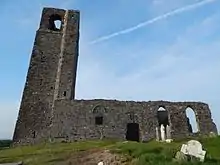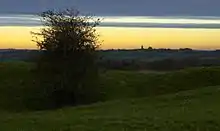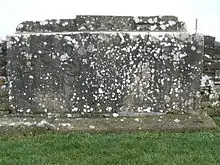Skryne Church
Skryne Church is a ruined medieval church and National Monument in County Meath, Ireland.[1]
| Skryne Church | |||||||||
|---|---|---|---|---|---|---|---|---|---|
| Skreen Church Skryne Tower The Steeple | |||||||||
Scrín Choluim Chille | |||||||||
 | |||||||||
 Skryne Church | |||||||||
| 53.585946°N 6.563023°W | |||||||||
| Location | Hill of Skryne, Skryne, County Meath | ||||||||
| Country | Ireland | ||||||||
| Denomination | Church of Ireland | ||||||||
| Previous denomination | Pre-Reformation Catholic | ||||||||
| History | |||||||||
| Founder(s) | Francis de Feypo, Baron Skryne | ||||||||
| Dedication | St. Lawrence O'Toole | ||||||||
| Relics held | Columba (formerly) | ||||||||
| Architecture | |||||||||
| Years built | 1341 | ||||||||
| Specifications | |||||||||
| Length | 36.3 m (119 ft) | ||||||||
| Width | 6.47 m (21.2 ft) | ||||||||
| Nave width | 6.47 m (21.2 ft) | ||||||||
| Height | 30 m (98 ft) | ||||||||
| Number of floors | 3 | ||||||||
| Floor area | 235 m2 (2,530 sq ft) | ||||||||
| Administration | |||||||||
| Diocese | Meath | ||||||||
| |||||||||
Location

Skryne Church is located atop the Hill of Skryne, 1.4 km (0.87 mi) northwest of Skryne village, 3.2 km (2.0 mi) east of the Hill of Tara.[2][3]
History
A monastery named Achall (after the legendary Achall) was on this site at an earlier date. The shrine of Columba (Colm Cille) or maybe some of his relics, was brought here in the 10th century for safe keeping, so it acquired the name Scrín Choluim Chille (Colmcille's Shrine; from Latin scrīnium). The monastery was plundered at least six times by various raiders, but it continued to run even after the Norman conquest of Ireland. Adam de Feypo, first Baron Skryne, founded a church dedicated to Nicholas of Myra and endowed it upon his brother Thomas, who joined the Cistercians of St. Mary's Abbey, Dublin. St Mary's held Skryne up until the Dissolution of the Monasteries in 1534.[4]
Skryne Church was built in 1341 as a house of Augustinians by Francis de Feypo, the last de Feypo Baron Skryne. The tower was added in the 15th century.[5]
Church
The church is a nave and chancel with mural stairs to a rood screen and an arched tomb recess. A carving of a man is near the door, possibly Colm Cille.[6] The bell tower is three storeys high and has a base-batter. It contains fragments of a baptismal font and a tomb slab. A medieval cross stands nearby.
Gallery
 Doorway with carved figure of saint above
Doorway with carved figure of saint above The Marward Stone, 16th-century burial site of the Barons Skryne
The Marward Stone, 16th-century burial site of the Barons Skryne
References
- "Skreen Church. Hill of Skryne. co. Meath - 1341".
- "Ireland In Ruins: Old Skreen Church Co Meath".
- http://www.meath.ie/CountyCouncil/Planning/TaraSkryneLandscapeProject/File,41581,en.pdf
- http://www.rathfeigh-historical-society.org/historical-society-articles-publications.php
- "Old Skryne Church, Scryne Hill, Co. Meath".
- "Skryne Church - Attractions - Churches, Abbeys and Monasteries - All Ireland - Republic of Ireland - Meath - Kells - Discover Ireland".